1. COMMUNICATION SKILLS
Effective communication skills are crucial for personal and professional success. Mastering these skills can significantly enhance your interactions and relationships, ensuring that your ideas and messages are conveyed clearly and effectively.
What Are Communication Skills?
Communication skills encompass the ability to convey information clearly and effectively, whether in writing or speaking. These skills include:
- Verbal Communication: Using words to express thoughts and ideas.
- Non-Verbal Communication: Using body language, facial expressions, and gestures.
- Listening Skills: Paying attention to others, understanding their messages, and responding thoughtfully.
- Written Communication: Crafting clear, concise, and accurate written messages.
Why Are Communication Skills Important?
- Professional Success: Good communication skills can enhance teamwork, reduce misunderstandings, and increase productivity. They are essential for effective collaboration and leadership.
- Personal Relationships: Clear communication fosters better relationships with family, friends, and colleagues by reducing conflicts and misunderstandings.
- Career Advancement: Employers value employees who can articulate ideas well and interact positively with others. Strong communication skills can lead to promotions and new opportunities.
How to Improve Your Communication Skills
- Practice Active Listening: Focus fully on the speaker, acknowledge their message, and provide feedback. This helps in understanding and responding more effectively.
- Enhance Your Verbal Skills: Use clear, concise language and avoid jargon. Tailor your message to your audience for better comprehension.
- Improve Non-Verbal Communication: Pay attention to your body language and facial expressions. Ensure they align with your verbal messages.
- Develop Writing Skills: Practice writing clearly and succinctly. Proofread your work to eliminate errors and ensure clarity.
- Seek Feedback: Ask for constructive feedback from peers or mentors and work on areas that need improvement.
Tips for Effective Communication in the Workplace
- Be Clear and Concise: Avoid ambiguity and get straight to the point.
- Be Empathetic: Understand others’ perspectives and respond with empathy.
- Maintain Professionalism: Use appropriate language and tone in professional settings.
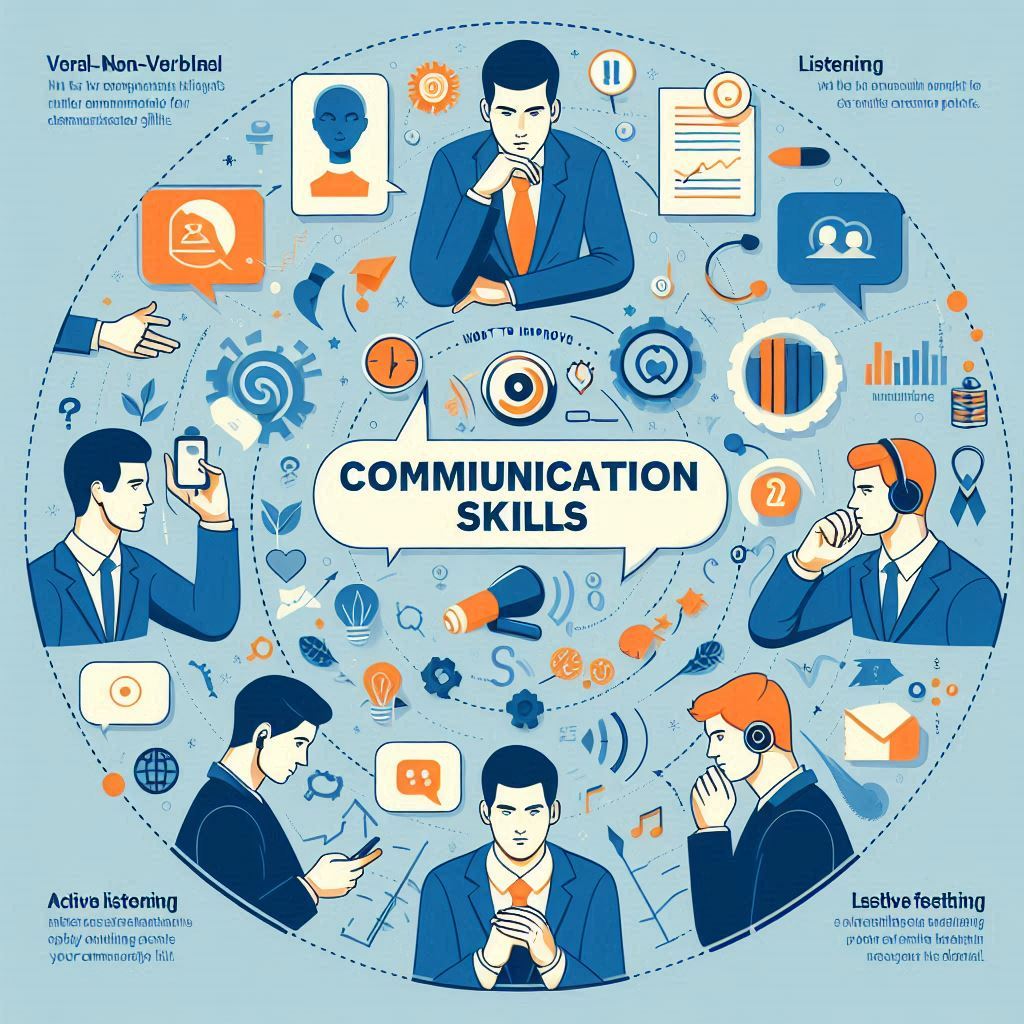
2. EMOTIONAL INTELLIGENCE (EQ)
Emotional Intelligence (EQ) refers to the ability to recognize, understand, and manage your own emotions and the emotions of others. Developing a high EQ can enhance your interpersonal relationships, decision-making, and overall well-being.
What Is Emotional Intelligence (EQ)?
Emotional Intelligence (EQ) encompasses several key components:
- Self-Awareness: Understanding your own emotions and how they affect your thoughts and behavior.
- Self-Regulation: Managing your emotions in a healthy way, controlling impulses, and adapting to changing circumstances.
- Motivation: Using your emotions to stay focused and achieve your goals, maintaining a positive attitude even in the face of challenges.
- Empathy: Recognizing and understanding the emotions of others, responding appropriately to their needs and feelings.
- Social Skills: Building and maintaining healthy relationships, communicating effectively, and resolving conflicts constructively.
Why Is Emotional Intelligence (EQ) Important?
- Improves Relationships: A high EQ helps you understand and relate to others better, fostering strong and positive relationships both personally and professionally.
- Enhances Decision-Making: By understanding your own emotions and those of others, you can make more informed and balanced decisions.
- Boosts Professional Success: Effective leaders and team members often possess high emotional intelligence. It enhances collaboration, conflict resolution, and leadership skills.
- Promotes Well-Being: High EQ can contribute to better mental health by helping you manage stress and navigate social challenges effectively.
How to Develop Your Emotional Intelligence (EQ)
- Practice Self-Reflection: Regularly evaluate your emotions and behaviors. Journaling can help you understand patterns and triggers.
- Improve Self-Regulation: Use techniques like mindfulness and deep breathing to manage your emotions and reduce impulsivity.
- Enhance Empathy: Actively listen to others and try to understand their perspectives and emotions.
- Build Social Skills: Engage in activities that promote teamwork and collaboration. Practice effective communication and conflict resolution.
- Seek Feedback: Ask for feedback from others about your emotional responses and interactions to identify areas for improvement.
Tips for Applying Emotional Intelligence in the Workplace
- Be Aware of Your Reactions: Pay attention to how your emotions influence your behavior and interactions.
- Practice Empathy: Show understanding and consideration for your colleagues’ feelings and viewpoints.
- Communicate Effectively: Use clear and constructive communication to build strong working relationships.
3. TEAMWORK AND COLLABORATION
Teamwork and collaboration are essential skills in both professional and personal settings. These skills involve working effectively with others to achieve common goals, leveraging the strengths and ideas of each team member.
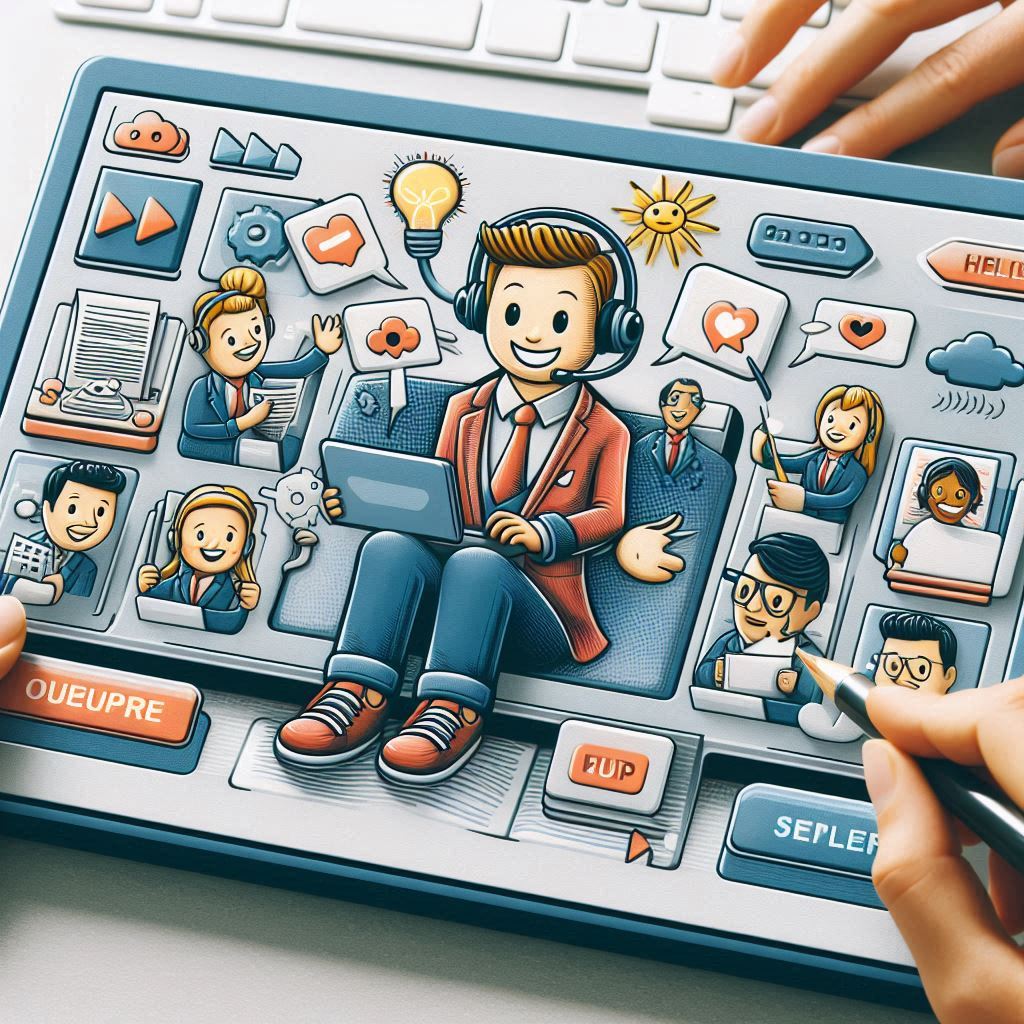
What Are Teamwork and Collaboration?
Teamwork refers to the ability to work well within a group to achieve shared objectives. It involves mutual support, respect, and coordination among team members.
Collaboration is the process of working together to create or achieve something. It goes beyond simply working in the same space; it involves active participation, idea sharing, and joint problem-solving.
Why Are Teamwork and Collaboration Important?
- Increased Efficiency: Working as a team can lead to faster and more efficient completion of tasks. By dividing responsibilities, teams can leverage diverse skills and expertise.
- Enhanced Creativity: Collaboration fosters a creative environment where diverse perspectives contribute to innovative solutions and ideas.
- Improved Problem-Solving: Teamwork allows for pooling of knowledge and skills, which can lead to more effective problem-solving and decision-making.
- Stronger Relationships: Effective teamwork and collaboration build stronger relationships and trust among team members, leading to a more harmonious work environment.
How to Foster Effective Teamwork and Collaboration
- Clear Communication: Ensure that all team members understand their roles, responsibilities, and objectives. Regularly update the team on progress and changes.
- Set Common Goals: Define clear, achievable goals that all team members can work towards. Align individual tasks with the overall objectives of the team.
- Encourage Participation: Create an environment where every team member feels valued and encouraged to contribute their ideas and opinions.
- Build Trust: Foster trust by being reliable, supportive, and respectful. Address conflicts constructively and ensure everyone feels heard.
- Utilize Tools and Technology: Use collaboration tools and software to facilitate communication, project management, and document sharing.
Tips for Effective Teamwork and Collaboration
- Define Roles and Responsibilities: Clearly outline who is responsible for what to avoid confusion and overlap.
- Promote a Positive Attitude: Encourage a supportive and positive attitude within the team to enhance cooperation and morale.
- Celebrate Successes: Recognize and celebrate team achievements to boost motivation and strengthen team cohesion.
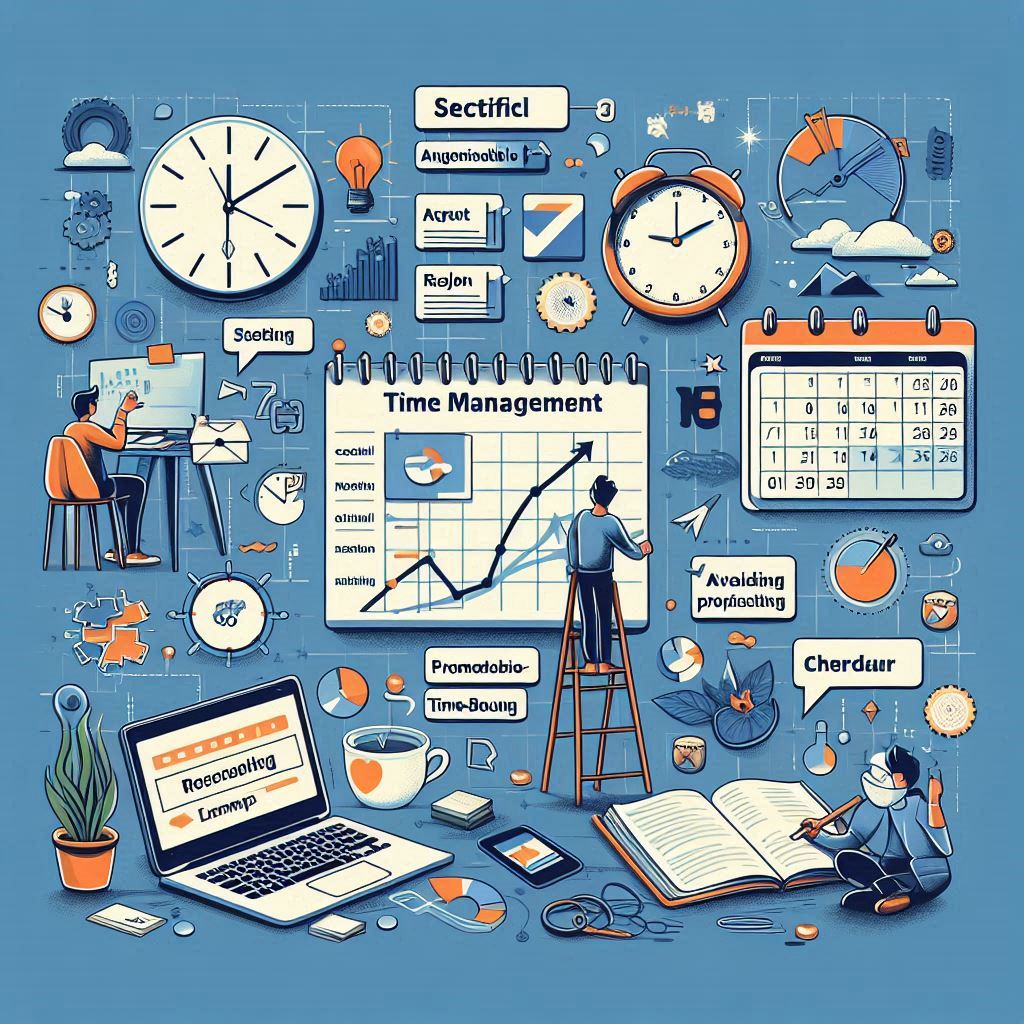
4. TIME MANAGEMENT
Time management is the practice of organizing and planning how to allocate your time effectively. Good time management allows you to work smarter, not harder, ensuring that you can complete tasks efficiently and achieve your goals.
What Is Time Management?
Time management involves setting priorities, planning your tasks, and making the best use of your time. It includes:
- Setting Goals: Identifying what you want to achieve and creating a plan to reach those objectives.
- Prioritizing Tasks: Determining which tasks are most important and need to be completed first.
- Scheduling: Allocating specific times for tasks and activities to ensure they are completed on time.
- Avoiding Procrastination: Addressing the tendency to delay tasks and finding strategies to stay focused and productive.
Why Is Time Management Important?
- Increases Productivity: Effective time management helps you complete more tasks in less time, leading to greater efficiency and productivity.
- Reduces Stress: By managing your time well, you can avoid the pressure of last-minute rushes and reduce stress levels.
- Improves Decision-Making: With a clear plan and priorities, you can make better decisions about how to spend your time.
- Enhances Work-Life Balance: Good time management allows you to allocate time for work as well as personal activities, leading to a better balance between the two.
How to Improve Time Management
- Set Clear Goals: Define specific, measurable, achievable, relevant, and time-bound (SMART) goals to guide your efforts.
- Create a To-Do List: Maintain a daily or weekly list of tasks to keep track of what needs to be done and prioritize your activities.
- Use a Calendar or Planner: Schedule tasks and appointments using a calendar or planner to manage your time effectively.
- Avoid Multitasking: Focus on one task at a time to improve quality and efficiency. Multitasking can lead to mistakes and decreased productivity.
- Set Time Limits: Allocate specific time limits for tasks to avoid spending too much time on any single activity.
- Take Breaks: Incorporate short breaks to rest and recharge, which can improve focus and prevent burnout.
Tips for Effective Time Management
- Prioritize Tasks: Use methods like the Eisenhower Matrix to categorize tasks by urgency and importance.
- Eliminate Distractions: Identify and minimize distractions that can hinder your productivity.
- Review and Adjust: Regularly review your time management strategies and make adjustments as needed to stay on track.
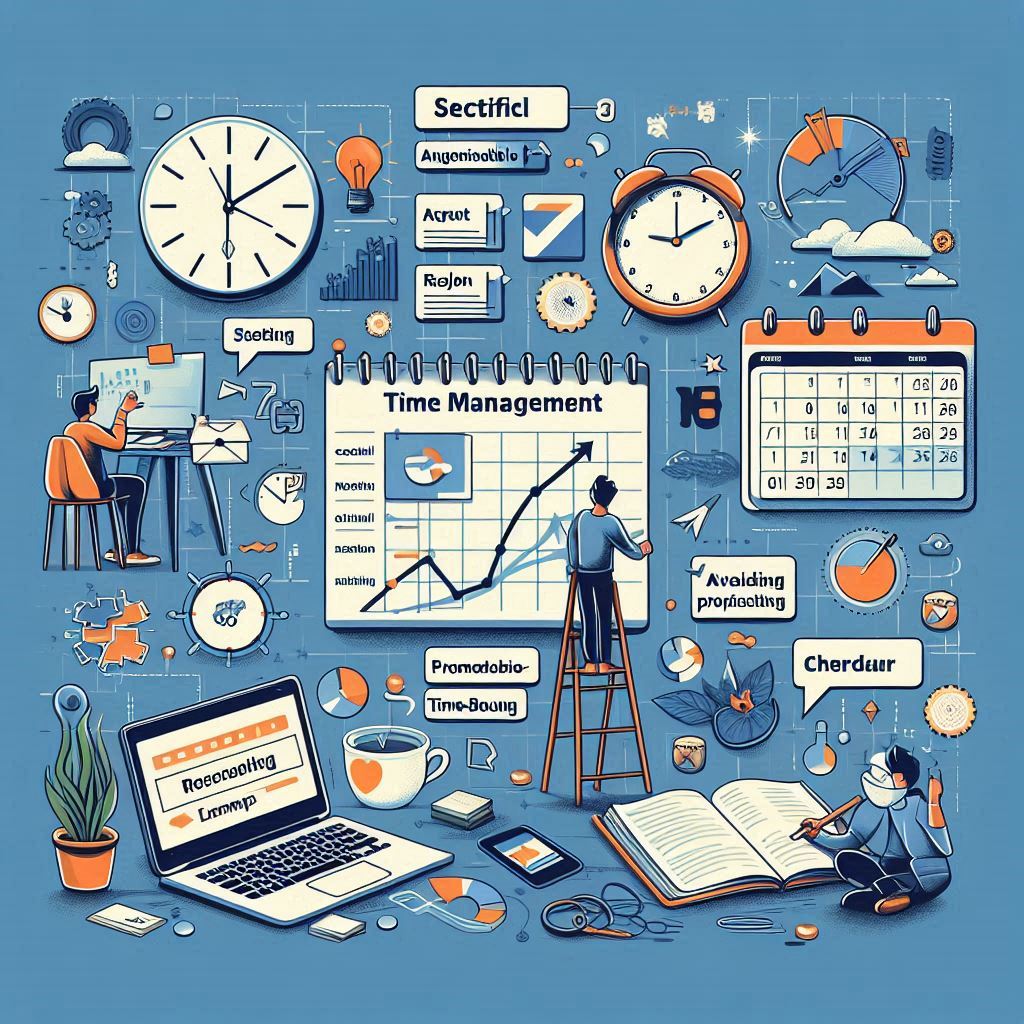
5. CRITICAL THINKING
Critical thinking is the ability to think clearly and rationally, understanding the logical connection between ideas. It involves analyzing information objectively, evaluating arguments, and making reasoned judgments. Developing strong critical thinking skills is essential for making informed decisions and solving problems effectively.
What Is Critical Thinking?
Critical thinking involves several key processes:
- Analysis: Breaking down complex information into smaller parts to understand it better.
- Evaluation: Assessing the credibility and relevance of information, arguments, or sources.
- Inference: Drawing logical conclusions based on evidence and reasoning.
- Reasoning: Applying logical principles to make coherent and reasoned judgments.
Why Is Critical Thinking Important?
- Improves Decision-Making: Critical thinking helps you assess options and make decisions based on careful consideration of all available evidence.
- Enhances Problem-Solving: By analyzing problems from multiple angles, you can develop effective solutions and strategies.
- Promotes Independent Thinking: It encourages you to question assumptions and think for yourself rather than relying on others’ opinions.
- Strengthens Communication: Clear and logical thinking improves your ability to articulate ideas and arguments effectively.
How to Develop Critical Thinking Skills
- Ask Questions: Cultivate curiosity by asking questions about information and ideas. Challenge assumptions and seek deeper understanding.
- Evaluate Evidence: Assess the reliability and validity of evidence before drawing conclusions. Consider the source, context, and relevance.
- Practice Reflective Thinking: Reflect on your own thinking processes and biases. Analyze how your views may affect your judgments.
- Engage in Discussions: Participate in discussions and debates to explore different perspectives and enhance your reasoning abilities.
- Solve Problems: Work on problem-solving exercises that require you to apply critical thinking principles. This can include puzzles, case studies, and hypothetical scenarios.
Tips for Applying Critical Thinking
- Be Open-Minded: Consider alternative viewpoints and be willing to revise your opinions based on new evidence.
- Think Systematically: Use structured approaches, such as pros and cons lists or decision-making frameworks, to analyze information.
- Avoid Cognitive Biases: Be aware of common biases that can skew your thinking, such as confirmation bias or overgeneralization.
6. LEADERSHIP
Leadership is the ability to guide, influence, and inspire others to achieve common goals. Effective leadership involves motivating and supporting a team, making strategic decisions, and setting a vision that aligns with organizational or personal objectives.
What Is Leadership?
Leadership encompasses several core elements:
- Vision: Setting a clear and compelling direction for the team or organization to follow.
- Inspiration: Motivating and encouraging others to commit to the vision and work towards achieving it.
- Decision-Making: Making informed and strategic choices that impact the team or organization.
- Communication: Clearly and effectively sharing information, expectations, and feedback with team members.
- Empowerment: Providing support and resources to enable others to perform their best and take initiative.
Why Is Leadership Important?
- Guides Direction: Effective leadership sets the course for the team or organization, ensuring everyone is working towards the same goals.
- Boosts Morale: A strong leader motivates and inspires team members, fostering a positive and productive work environment.
- Facilitates Growth: Leaders help individuals develop their skills and advance their careers by providing guidance and opportunities.
- Enhances Performance: Good leadership can improve overall team performance and drive success by aligning efforts and resources effectively.
How to Develop Leadership Skills
- Build a Vision: Develop a clear vision for what you want to achieve and communicate it effectively to inspire others.
- Enhance Communication: Practice clear, honest, and open communication to ensure that all team members understand their roles and expectations.
- Practice Decision-Making: Make thoughtful and strategic decisions by gathering relevant information, considering alternatives, and evaluating potential outcomes.
- Foster Team Development: Support and mentor team members to help them grow and reach their full potential.
- Lead by Example: Demonstrate the values, work ethic, and behaviors you expect from others.
Tips for Effective Leadership
- Be Adaptable: Adjust your leadership style to fit different situations and the needs of your team.
- Encourage Feedback: Regularly seek and act on feedback from team members to improve your leadership approach.
- Promote Collaboration: Foster a collaborative environment where team members feel valued and are encouraged to contribute their ideas.
7. CREATIVITY AND INNOVATION
Creativity and innovation are crucial skills for solving problems, driving progress, and staying competitive in any field. While creativity involves generating new and original ideas, innovation focuses on implementing those ideas to create value and make improvements.
What Are Creativity and Innovation?
Creativity refers to the ability to think outside the box, come up with novel ideas, and see things from different perspectives. It involves using imagination and originality to create new concepts or approaches.
Innovation is the process of turning creative ideas into practical applications or solutions. It involves applying new ideas to improve products, services, or processes, making them more effective or valuable.
Why Are Creativity and Innovation Important?
- Drives Progress: Creativity and innovation lead to the development of new products, services, and processes, contributing to advancement and growth.
- Enhances Problem-Solving: Innovative thinking helps find unique solutions to complex problems, improving efficiency and effectiveness.
- Improves Competitiveness: Organizations that foster creativity and innovation can differentiate themselves from competitors and adapt to changing market conditions.
- Fosters Growth: Encouraging a culture of creativity and innovation can lead to personal and professional growth, enhancing skills and expanding opportunities.
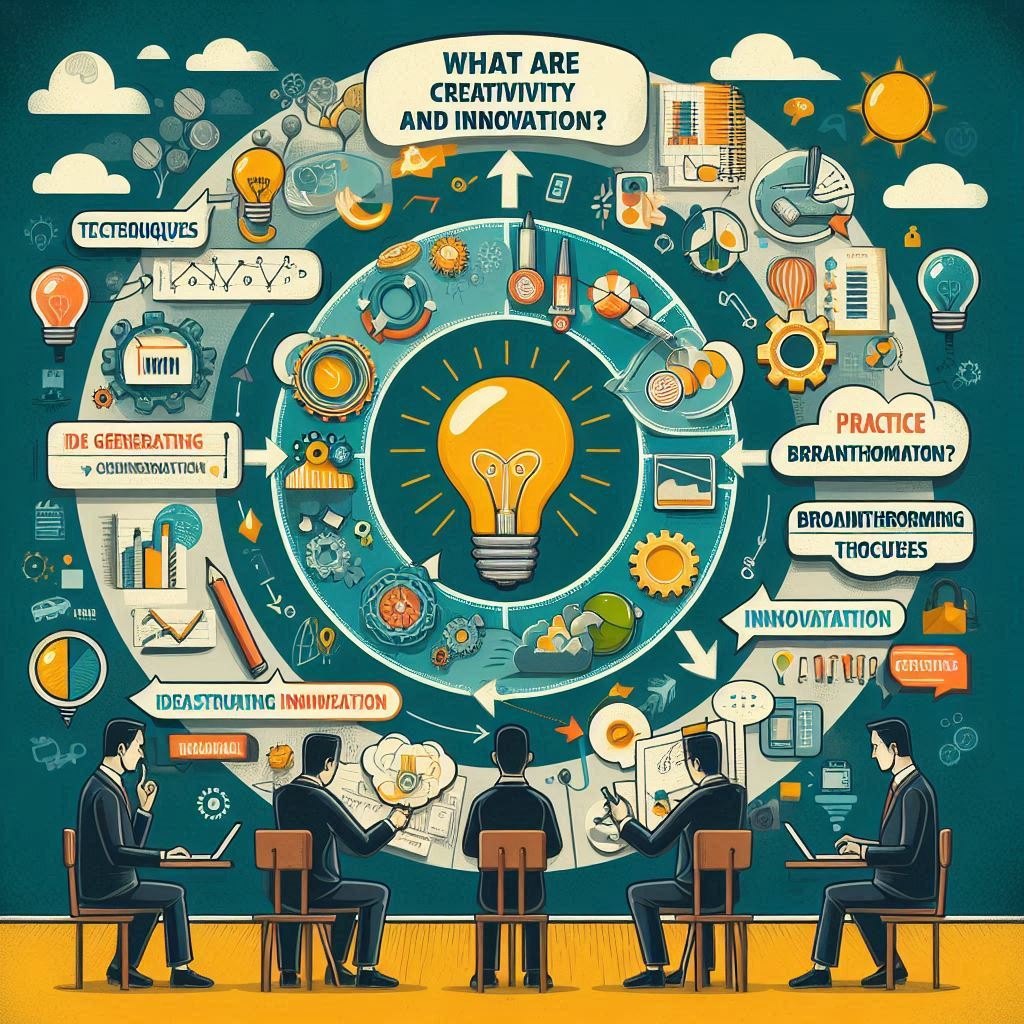
How to Foster Creativity and Innovation
- Encourage Open-Mindedness: Create an environment where new ideas are welcomed and diverse perspectives are valued. Avoid dismissing ideas too quickly.
- Provide Resources: Offer tools, training, and time to explore new ideas and experiment with innovative solutions.
- Promote Collaboration: Facilitate collaboration among team members to combine different skills and viewpoints, which can spark creative ideas.
- Support Risk-Taking: Encourage taking calculated risks and learning from failures. Innovation often involves experimenting and iterating.
- Stay Curious: Cultivate a curious mindset by seeking out new experiences, learning from different fields, and staying informed about industry trends.
Tips for Enhancing Creativity and Innovation
- Practice Brainstorming: Regularly engage in brainstorming sessions to generate and refine new ideas.
- Create a Stimulating Environment: Design a workspace that inspires creativity and minimizes distractions.
- Encourage Continuous Learning: Stay open to new knowledge and skills to fuel creativity and support innovative thinking.

